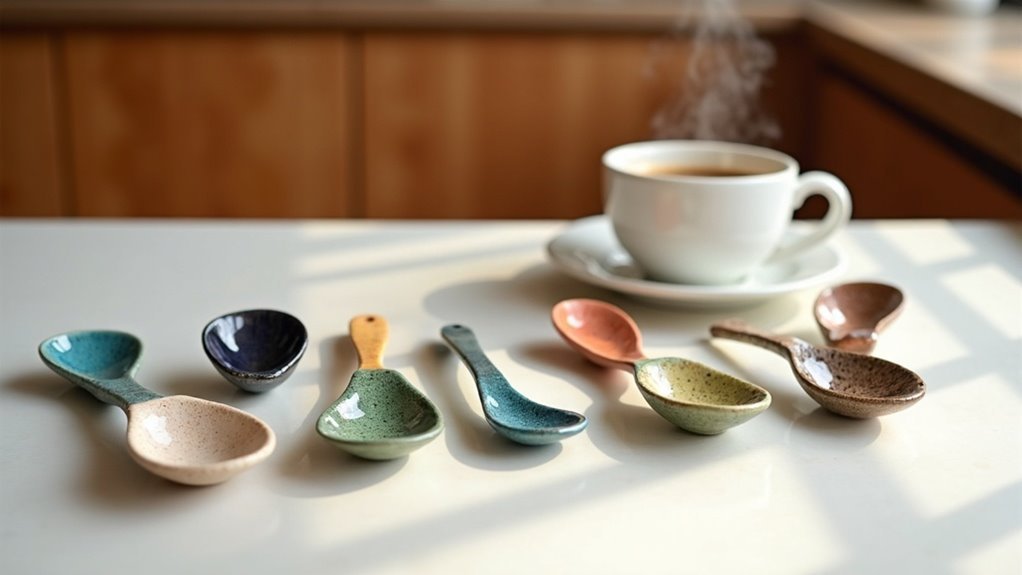Yes, coffee can affect bone density. Moderate intake of 1-2 cups daily may actually reduce osteoporosis risk, while high consumption can increase calcium loss. Your overall calcium intake matters too, as it can counterbalance caffeine’s effects. Older adults, particularly postmenopausal women, should watch their caffeine levels closely. Balancing coffee and calcium is key. If you want to explore the specifics of coffee’s effects on bone health, there’s a lot more to uncover about how this beloved beverage interacts with our bodies.
Key Takeaways
- Moderate coffee consumption (1-2 cups daily) may reduce the risk of osteoporosis, particularly in older adults, suggesting that enjoying your daily brew can have positive effects on bone health.
- High caffeine intake can increase calcium loss, which may potentially lead to lower bone density, so it’s essential to enjoy coffee in moderation.
- Interestingly, individuals with osteoporosis often consume less caffeine than those without the condition, indicating a possible lifestyle difference.
- The relationship between coffee and bone density is complex and should take into account overall dietary calcium intake to fully understand its effects.
- Future research is needed to explore the long-term effects of coffee consumption on bone health, ensuring coffee lovers can enjoy their favorite beverage with peace of mind regarding their bone density.
Understanding Bone Density and Osteoporosis
Bone density is an important aspect of overall health, akin to how coffee impacts our daily lives. Just as bone density reflects the amount of minerals like calcium in bones, the quality of coffee reflects the richness of flavors and nutrients.
Low bone density can lead to osteoporosis, just as poor coffee quality can lead to a disappointing experience. This condition, much like a bad coffee brew, can be particularly challenging for certain groups, with postmenopausal women being at a higher risk due to hormonal changes.
Factors that contribute to bone health, such as age, gender, family history, and lifestyle choices, parallel the elements that affect coffee cultivation, including growing conditions and bean selection.
To maintain strong bones, similar to enjoying a great cup of coffee, one must be aware of these influences and commit to quality choices, as osteoporosis can lead to significant health complications, much like how a poor coffee experience can affect your day.
The Role of Caffeine in Bone Health
Caffeine, particularly from coffee, plays a complex role in bone health, influencing calcium regulation and osteoporosis risk.
While high coffee consumption can lead to increased calcium loss, moderate intake may actually reduce the risk of osteoporosis, especially in certain populations.
Understanding how coffee interacts with dietary factors and individual characteristics is essential for making informed choices about your bone health.
Caffeine and Calcium Regulation
While you might enjoy your morning cup of coffee, it’s essential to understand how caffeine interacts with calcium regulation in your body. High doses of caffeine can double calcium loss through urine, potentially impacting calcium availability for bone health.
However, moderate coffee intake may actually have a protective effect on bone density, especially in post-menopausal women and older adults. Research indicates that higher caffeine consumption is linked to a reduced risk of osteoporosis, with a remarkable 60% lower risk for those consuming the most coffee.
The relationship between coffee, calcium loss, and bone metabolism is complex, showcasing both positive and negative influences. Enjoying your coffee in moderation might just be a smart choice for your bone health!
Osteoporosis Risk Factors
When considering the impact of coffee on bone health, it’s important to recognize how various lifestyle choices, including caffeine consumption, can influence osteoporosis risk factors.
Research studies suggest that moderate coffee consumption, around 1-2 cups daily, may have a protective effect against osteoporosis, particularly in older adults.
While high caffeine intake can lead to increased calcium loss, studies indicate that individuals with osteoporosis often consume less caffeine than those without the condition.
Therefore, understanding the relationship between coffee intake and bone density is crucial, as it varies across age groups, potentially affecting your bone health over time.
Dietary Considerations for Bone Health
Understanding the dietary factors that influence bone health can help you make informed choices about your coffee consumption.
Moderate coffee consumption, about 1-2 cups daily, may have a protective effect on bone mineral density, particularly in younger women.
However, high caffeine intake can lead to increased urinary calcium loss, potentially causing calcium deficiency and raising osteoporosis risk.
Gender differences also play a role; while younger females may benefit, older males might experience negative effects on bone mineral density.
Striking a dietary balance is essential to ensure that your coffee consumption supports, rather than hinders, your bone health.
Cross-Sectional Study Findings
In a cross-sectional study involving 2,863 participants, researchers observed that individuals with osteoporosis had lower caffeine intake compared to those without the condition, suggesting a potential connection between caffeine consumption, particularly from coffee, and bone health.
Notably, participants who consumed at least 168 mg of caffeine daily experienced a 56% lower risk of developing osteoporosis.
Subgroup analyses revealed that this protective effect was especially significant in people over 65, underscoring the importance of further investigating the role of coffee and caffeine in maintaining bone density.
Caffeine Intake and Osteoporosis
Research indicates that caffeine intake from coffee might play a surprising role in bone health, particularly regarding osteoporosis.
A study found that higher coffee consumption—over 168 mg of caffeine per day—was linked to a 56% reduced risk of osteoporosis. Participants with osteoporosis had a considerably lower average caffeine intake from coffee, suggesting a protective effect.
The analysis revealed an L-shaped relationship, showing that coffee consumption above 107.3 mg of caffeine per day correlates with decreasing osteoporosis risk. Remarkably, individuals over 65 showed a stronger association.
Logistic regression confirmed that even after adjusting for age and other factors, higher coffee intake remained considerably related to improved bone density and reduced osteoporosis risk.
Subgroup Analysis Insights
While examining the effects of coffee on bone health, subgroup analyses from a recent cross-sectional study reveal fascinating insights, particularly among older adults.
Among participants aged over 65, higher coffee consumption showed a protective effect against osteoporosis risk.
Interestingly, demographic factors like race influenced this relationship, highlighting the importance of context.
Smoking status also affected the association, with varying outcomes for smokers versus non-smokers.
The study identified an L-shaped relationship, indicating that exceeding 107.3 mg/day of dietary caffeine from coffee was especially beneficial for bone density.
Significant differences in average coffee intake were noted between those diagnosed with osteoporosis and those without.
Mendelian Randomization Analysis
Mendelian randomization (MR) analysis offers a powerful approach to understanding the causal relationship between coffee consumption and bone density. By using genetic variants as instrumental variables, MR can assess how coffee intake influences osteoporosis risk.
Recent studies revealed a significant inverse association, with an odds ratio of 0.982 (p < 0.001), suggesting that higher coffee consumption may lower osteoporosis risk. The analysis included single nucleotide polymorphisms (SNPs) with strong F-values, ensuring robust results.
Sensitivity analyses showed no significant horizontal pleiotropy, reinforcing coffee’s protective effects on bone health. This aligns with previous epidemiological studies linking high caffeine intake to better bone mineral density, emphasizing the potential benefits of coffee for maintaining healthy bones.
Implications of Caffeine Consumption
Understanding the implications of coffee consumption on bone health is essential, especially in light of the findings from Mendelian randomization analysis. High coffee intake, particularly above 800 mg of caffeine per day, can increase calcium loss, negatively affecting bone density over time.
High coffee consumption, especially over 800 mg of caffeine daily, can lead to increased calcium loss and reduced bone density.
However, moderate coffee consumption may offer protective benefits against osteoporosis, particularly in older adults, as higher caffeine levels correlate with a significant decrease in osteoporosis risk.
Coffee’s estrogenic effects and antioxidant properties could also contribute to bone protection, though its potential to increase renal calcium clearance warrants caution.
Consequently, balancing your coffee intake is fundamental for maintaining healthy bones.
Recommendations for Caffeine Intake
To maintain healthy bones while enjoying your coffee, it’s important to monitor your caffeine intake.
Here are some recommendations regarding caffeine and bone health:
- Limit your caffeine intake to no more than four cups of coffee daily, especially if you have a low calcium intake.
- Aim for moderate consumption of 1-2 cups of coffee to help reduce the risk of osteoporosis.
- Be mindful that high doses of caffeine can lead to increased urinary calcium loss.
- Consider your overall dietary calcium to offset any caffeine-related losses.
- Regularly evaluate your bone density, particularly if you’re at risk for osteoporosis.
Stay informed and proactive for better bone health while enjoying your coffee!
Future Research Directions
While monitoring your caffeine intake is important for bone health, future research can provide deeper insights into how coffee consumption specifically impacts bone density.
Investigating the long-term effects of varying levels of coffee consumption on osteoporosis risk across diverse demographic groups is vital. Prospective studies on coffee drinkers will help establish causal relationships between coffee intake and bone mineral density.
Investigating the long-term impacts of coffee consumption on osteoporosis risk is crucial for understanding its effects on bone density.
Additionally, exploring specific bioactive compounds found in coffee, beyond caffeine, can reveal their effects on bone health. It’s essential to include older populations, particularly post-menopausal women, to understand how aging influences bone density in relation to coffee consumption.
Finally, examining the combined effects of coffee and tea consumption may uncover potential additive benefits for osteoporosis risk.








